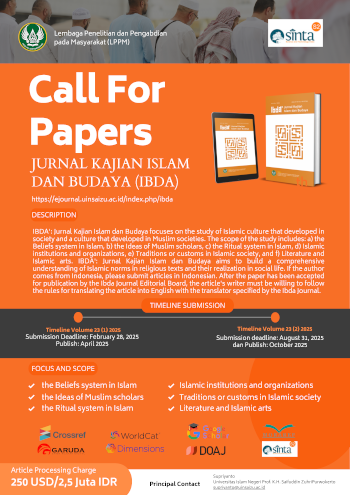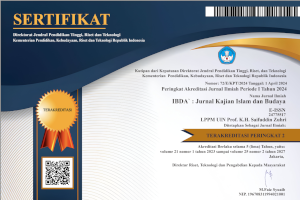Between Western Philosophy and Islamic Philosophy
An Effort to Examine The Common Point and The Point of Difference
DOI:
https://doi.org/10.24090/ibda.v20i2.6362Keywords:
Western Philosophy, Islamic Philosophy, Meeting Point, Difference PointAbstract
This study wants to analyze the common points and the points of difference between Western and Islamic philosophy. This is qualitative research using the exploratory-analytical method. This study finds that Western and Islamic philosophy has contributed to each other. The common point between Western and Islamic Philosophy lies in transmitting the truth. Meanwhile, we can see the point of difference in three aspects. First is the source of knowledge. Western philosophy comes from reason and the five senses, while Islamic philosophy is not only that but also from authority (al-Quran and al-Sunnah). Second, the characteristics of knowledge. Characteristics of knowledge in Western philosophy, namely, skeptical, rational-empirical, dichotomous, and positivistic-objective; while in Islamic Philosophy, namely, Qur'anic, harmonization of reason and revelation, theocentric, and value point of view. The third is the truth value of knowledge. The truth value of knowledge in Western philosophy is relative, while Islamic philosophies are absolute and some are relative.Downloads
References
Adhim, Fauzan. (2018). “Filsafat Islam: Sebuah Wacana Kefilsafatan Klasik Hingga Kontemporer”. Malang: CV. Literasi Nusantara Abadi.
Aravik, Havis dan Hoirul Amri. (2011). “Menguak Hal-hal Penting dalam Pemikiran Filsafat al-Kindi”. Salam: Jurnal Sosial dan Budaya Syar-i. 06 (02). http://journal.uinjkt.ac.id/index.php/salam/article/view/11228.
Bagir, Haidar. (2020) Mengenal Filsafat Islam. Bandung: Mizan.
Baharuddin, Ahmad (2015). “Ibnu Sina dan Pemikiran Teori Emanasi”. Jurnal Adabiyah, 15 (02).
Etuk, Anthony R. (2021). “The Enduring Influence of St. Augustine in Western Philosophy”. United International Journal for Research & Technology. 02 (03). https://uijrt.com/paper/the-enduring-influence-st-augustine-western-philosophy.
Faizah, Luluk Nur. (2017). “Filsafat Islam dan Hubungannya dengan Filsafat Masehi, Yunani, Modern”. Jurnal al-Makrifat. 02 (02). https://core.ac.uk/download/pdf/234800636.pdf.
Hamdi, Saibatul dkk. (2021). “Mengelaborasi Sejarah Filsafat Barat dan Sumbangsih Pemikiran Para Tokohnya”. Jurnal Pemikiran Islam. 01 (01). https://jurnal.ar-raniry.ac.id/index.php/jpi/article/view/11378.
Husaini, Adian. (2019). Filsafat Ilmu: Perspektif Barat dan Islam. Jakarta: Gema Insani.
Jauhari, Sofuan. (2020). “Kontruksi Filsafat Islam terhadap Filsafat Yunani dan Filsafat Barat Modern”. Ngabari: Jurnal Studi Islam dan Sosial. 13 (01). https://ejournal.iairm-ngabar.ac.id/index.php/Ngabari/article/view/44/46.
Kalumbang, Yuventia Prisca. (2018). “Kritik Pragmatisme Richard Rorty terhadap Epistemologi Barat Modern”. Jurnal Filsafat. 28 (02). https://journal.ugm.ac.id/wisdom/article/view/36413/21976.
Maskhuroh, Lailatul. (2021). “Aliran-aliran Filsafat Barat Kontemporer (Postmodernisme)”. Urwatul Wustqo: Jurnal Studi Kependidikan dan Keislaman. 10 (01). https://www.jurnal.stituwjombang.ac.id/index.php/UrwatulWutsqo/article/view/258/174.
Musa, Abdulrashid dkk. (2018). “An Overview on al-Kindi’s Translations at House of Wisdom: An Islamic Philosophical Reflection”. International Journal of Innovative Social Sciences and Humanities Research. 06 (04). https://seahipaj.org/journals-ci/dec-2018/IJISSHR/full/IJISSHR-D-4-2018.pdf.
Musakkir. (2021). “Filsafat Modern dan Perkembangannya (Renaissance: Rasionalisme dan Emperisme)”. Tajdid: Jurnal Pemikiran Keislaman dan Kemanusiaan. 05 (01). http://ejournal.iaimbima.ac.id/index.php/tajdid/article/view/626/453.
Nurohman, Muhamad Agus. (2020) “Studi tentang Filsafat, Ilmu dan Periodesasi Perkembangannya”. Dewantara. 10 (02). http://ejournal.iqrometro.co.id/index.php/pendidikan/article/view/153
Obaid, Moh. Yahya. (2010). “Kontribusi Islam terhadap Kebangkitan Barat”. Shautut Tarbiyah. 16 (01). https://ejournal.iainkendari.ac.id/index.php/shautut-tarbiyah/article/view/117/118.
Saputra, Hendri. (2018). “Pemikiran Filsuf Barat dan Islam terhadap Konsep Dinamika Gerak”. Jurnal Filsafat Indonesia. 01 (01). https://ejournal.undiksha.ac.id/index.php/JFI/article/view/13990.
Siraj, Fuad Mahbub, (2015) “Relevansi Filsafat Islam Pada Era Modern”, Jurnal Universitas Paramadina, 12 (1), 2015, 1379-1397, https://journal.paramadina.ac.id/index.php/upm/article/view/98.
Siraj, Fuad Mahbub, (2014) “Kosmologi dalam Tinjauan Failasuf Islam, Jurnal ilmu Ushuluddin, 2 (2) 2014, 109-124, http://journal.uinjkt.ac.id/index.php/ilmu-ushuluddin/article/view/1007.
Soleh, A. Khudori. (2014). “Mencermati Sejarah Perkembangan Filsafat Islam”. Jurnal Tsaqafah. 10 (01). https://ejournal.unida.gontor.ac.id/index.php/tsaqafah/article/view/64/55.
Suprapto, Hadi. (2017). “Al-Farabi dan Ibnu Sina (Kajian Filsafat Emanasi dan Jiwa dengan Pendekatan Psikologi)”. Al-Hadi. 02 (02). https://journal.pancabudi.ac.id/index.php/alhadi/article/view/152/134.
Wahyuningsih, Sri. (2021). “Sejarah Perkembangan Filsafat Islam”. Jurnal Mubtadiin. 07 (01). https://journal.an-nur.ac.id/index.php/mubtadiin/article/download/54/44/187.
Zar, Sirajuddin. (2004). Filsafat Islam: Filosof dan Filsafatnya. Jakarta: PT RajaGrafindo Persada.
Downloads
Published
How to Cite
Issue
Section
License
Copyright (c) 2022 Amril, Fuad Mahbub Siraj, Endrika Widdia Putri

This work is licensed under a Creative Commons Attribution-ShareAlike 4.0 International License.
Authors who publish with this journal agree to the following terms:
- Authors retain copyright and grant the journal right of first publication with the work simultaneously licensed under a Creative Commons Attribution-ShareAlike License a that allows others to share the work with an acknowledgement of the work's authorship and initial publication in this journal.
- Authors are able to enter into separate, additional contractual arrangements for the non-exclusive distribution of the journal's published version of the work (e.g., post it to an institutional repository or publish it in a book), with an acknowledgment of its initial publication in this journal.
- Authors are permitted and encouraged to post their work online (e.g., in institutional repositories or on their website) before and during the submission process, as it can lead to productive exchanges, as well as earlier and greater citation of published work (See The Effect of Open Access).















